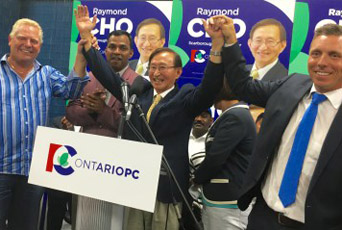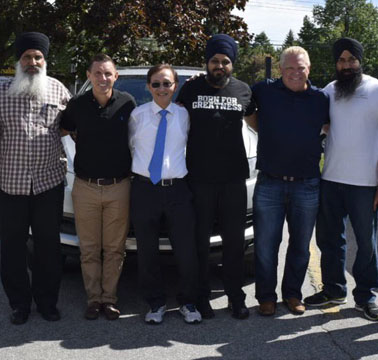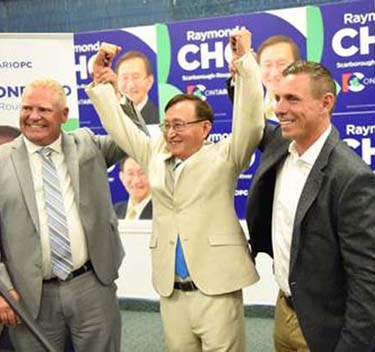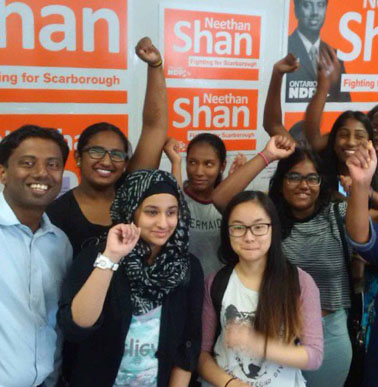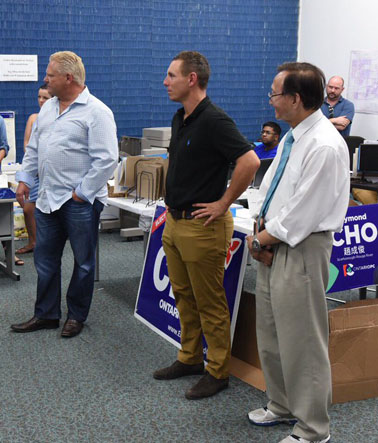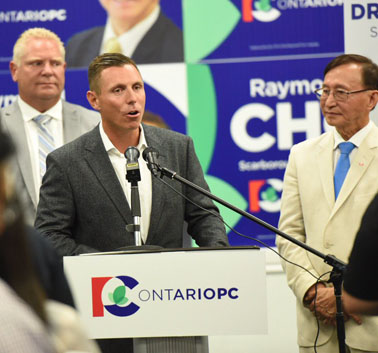How important was Rob Ford’s brother in latest Ontario byelection?
Sep 4th, 2016 | By Randall White | Category: In Brief
GANATSEKWYAGON, ON. The return to realism after Labour day is almost here. And it suddenly becomes clear that this past Thursday’s Scarborough-Rouge River byelection was a welcome splash of cold water for we rare but resolute fans of Ontario provincial politics.
(See, eg : “Ontario Tories win hotly-contested Toronto-area byelection” by Allison Jones at The Canadian Press ; and “Tory Raymond Cho wins Scarborough-Rouge River byelection … Stunning victory seen as political blow to  Wynne’s Liberals,” by Robert Benzie, Queen’s Park Bureau Chief at the Toronto Star.)
Here as elsewhere, Ontario politics is something that general voters lose interest in from time to time. It is part of the Ontario political tradition that nothing all that interesting happens very often in any case.
That’s the way Ontario political leaders have at least traditionally liked it. Or as a modern master  has explained : “The people of Ontario have never been spoiled by too much perfection in government.” (W.G. Davis, premier 1971—1985.)
Then something for some reason suddenly casts an almost startling bright light on certain cogs in the machine.
You realize all over again that Ontario politics is actually fascinating.
Especially in the early 21st century, when the Canadian region north of the Great Lakes often seems a stark illustration of the English historian J.H. Plumb’s wise words :
“Traditions are quickly bred and quickly destroyed and they snap suddenly in a world of rapid social change.”
1. The riding : Scarborough-Rouge River
Just to start with, take the riding (aka “provincial electoral district”) of Scarborough-Rouge River itself. It is stuck up in the northeast corner of the new amalgamated City of Toronto that Mike Harris’s so-called “common sense revolution” created in the late 1990s.
It lies somewhere between the urbs and the suburbs, or the old and new suburbs, or the suburbs and the exurbs. And it takes in the eastern branch of the old Toronto Passage indigenous canoe-and-portage waterway to the Canadian northwest.
As the newspapers explain, [more than] 90% of  Scarborough-Rouge River residents are what  Canadian statisticalese rather cutely (and inappropriately in this case) calls “Visible Minorities.” (Which probably best translates into US statistical English as “Non-White”: see below.)
Looking at the “Ethnic Groups” data from the 2011 Census of Canada (as mediated by Wikipedia), about 33% are South Asian, 31% Chinese, 11% Black, 9% White, and 8% Filipino (leaving a final 8% from many other groups, whatever that may mean more exactly).
It is true enough that close to two-thirds of Scarborough-Rouge River residents today are immigrants, or individuals who were not born in Canada. (Which also means that more than a third of all the “Visible Minorities” were born in Canada – and there is a quite uniform northern North American English spoken by young people in local tax-supported schools.)
At the same time, 85% of the diverse populace in Scarborough-Rouge River are signed-up Canadian citizens. And the median household income is $61,786, weighing in slightly above the median income for Canada at large.
2. The September 1, 2016 by-election
Then there is this past Thursday’s provincial byelection in Scarborough-Rouge River. And it is interesting enough in its own right.
As many as 11 candidates were in the race (including Green, Libertarian, People’s Political Party, and None of the Above – and John Turmel of the Pauper party, who apparently holds Guinness Book of Records prizes for both most elections contested and most elections lost in the world.
About 95% of the vote nonetheless went to candidates for the three main parties in the Ontario Legislative Assembly today – Liberal, New Democratic, and Progressive Conservative.
Until this past Thursday Liberal candidates had held the riding since 1999. The history-making winning candidate this time around is the Progressive Conservative Raymond Cho. And he is an intriguing character in his own right.
For a more detailed account see Mike Adler’s Scarborough Mirror report , “Raymond Cho, an unlikely Progressive Conservative, becomes new Scarborough-Rouge River MPP .”
On a quick-and-dirty sketch, Mr. Cho is 79 years old! He came to Canada from South Korea in 1967, and “obtained both his Master’s Degree in Social Work and Doctorate Degree in Education from the University of Toronto.” Â After a career as a social worker, he was first elected to Toronto City Council representing northeast Scarborough in 1991. He won Toronto council seats for the area again in 1994, 1997, 2000, 2003, 2006, 2010, and 2014.
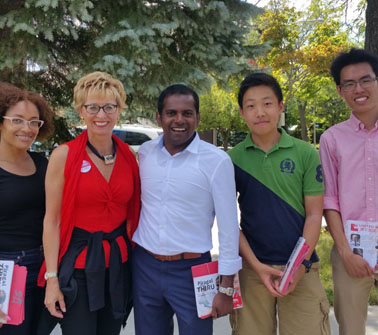
Liberal candidate Piragal Thiru (centre), with friends on the campaign trail in Scarborough-Rouge River.
As long ago as the 1988 Canadian federal election Mr. Cho ran unsuccessfully for the New Democrats in Scarborough–Rouge River, and he had a second unsuccessful bid for the federal riding as an Independent in 2004. In the 2014 Ontario general election he finished third in the Scarborough–Rouge River provincial riding, running for the Progressive Conservatives.
The two main party losing candidates in the Scarborough–Rouge River provincial riding this past Thursday – Piragal Thiru for the Liberals and Neethan Shan for the New Democrats – are both Tamil-Canadians who apparently came to Canada as refugees from Sri Lanka in their youth.
For more detail see : “Piragal Thiru gets Liberal nod for Scarborough-Rouge River provincial byelection” ; and “Profile: The making of the NDP’s ‘perennial candidate’ Neethan Shan.”
Finally, here in round numbers are the results from this past Thursday, September 1, 2016 : Raymond Cho, Progressive Conservative – 39% ; Piragal Thiru, Â Liberal – 29% ; Neethan Shan, New Democrat – 27%.
Voter turnout for Scarborough–Rouge River in the 2014 Ontario general election was at the low end of the provincial spectrum, at not quite 48% of eligible voters.
Voter turnout for the 2016 bylection was just over  28%. (And byelections of course – aka special elections in the USA – typically attract lower turnout. Voters understand they are less important.)
3. What does the PC byelection victory mean?
Allison Jones at The Canadian Press notes that Raymond Cho’s victory in Scarborough–Rouge River is “the third byelection in a row the Tories have won since Patrick Brown became leader last year and a breakthrough for the party in Toronto, where they hold no other seats.”
Ms. Jones goes on : “Brown said the victories herald a PC majority in the next provincial election … Â ‘There is not any riding in the province of Ontario that Kathleen Wynne’s Liberal party can take for granted,’ he said.”
At the same time, Ms. Jones adds that the byelection race “was dominated in the last week by a Tory flip-flop on sex education. A letter distributed under Brown’s name promised that a PC government would ‘scrap’ updates to the sex-ed curriculum.”
Again, Ms Jones goes on : “It would have been a popular promise, Brown acknowledged, saying there was deep opposition to the curriculum in that riding … But Brown disavowed the letter days later, saying he didn’t know about it and actually won’t scrap the curriculum despite what he calls a lack of parental consultation.”
Whether this “Tory flip-flop” will still hurt Patrick Brown’s PC party further down the road remains some kind of question.
And Robert Benzie at the Toronto Star notes that : “While the Tories won a 2013 byelection in Etobicoke-Lakeshore – held by former councillor Doug Holyday for nine months before losing in [the general election of] 2014 – they have not triumphed in a Toronto riding in a general election since 1999 when Mike Harris was premier.”
Others will say it is Raymond Cho’s long career in the area that won this past Thursday, not anything done by Ontario PC leader Patrick Brown. (Though it is also true that Mr. Cho’s long local career didn’t help him win Scarborough–Rouge River in the 2014 Ontario general election, when the PC s were still being led by Tim Hudak.)
Still others might note that Mr. Cho himself has been thanking his campaign co-manager (and brother of the late former mayor Rob Ford). As Robert Benzie also explains : “Ontario’s newest MPP credited Doug Ford for his success … ‘Without his help, I don’t think I would win this election,’ said Cho.”
This at least seems to add another qualifying wrinkle to current PC leader Patrick Brown’s theory about “a PC majority in the next provincial election.”
Some will already say (and have, including the Toronto Sun and National Post) Â that Mr. Brown just doesn’t look like the kind of Ontario PC leader that has won elections in the past. And the ubiquitous images of Patrick Brown, Raymond Cho, and Doug Ford in the Scarborough-Rouge River byelection (on TV and on the net and more) will make other voters wonder just who the real leader of the Ontario PC party is nowadays – Patrick Brown or Doug Ford ????
4. Premier Wynne’s reaction …
Allison Jones reports that once this past Thursday’s numbers in Scarborough Rouge River were clear, Ontario Premier Kathleen “Wynne released a statement saying the byelection result gives her ‘cause for reflection’ … ‘We heard at the door that hydro rates are increasingly challenging for people,’ she wrote. ‘government needs to focus on helping people with their everyday expenses.’”
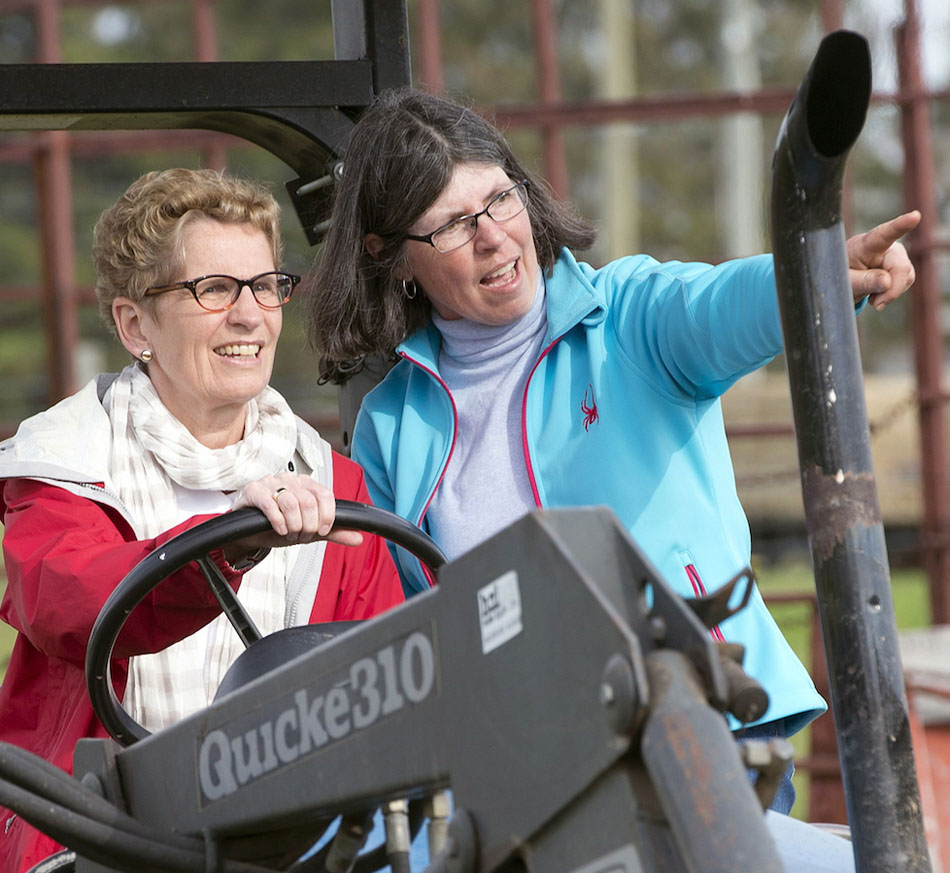
Ontario Premier Kathleen Wynne gets tips on tractor driving from farmer Sandra Vos (right) in Paris, Ontario, May 20, 2014. Photo : Frank Gunn/CP.
This seems to me at any rate a very sensible thing for the premier to be saying right now.
Note as well that Robert Benzie reports : “Wynne will call a byelection to fill the former Ottawa-Vanier seat of retired Liberal minister Madeleine Meilleur later this year … There will also be a byelection before the end of March in Niagara West-Glanbrook after former Tory leader Tim Hudak resigns his seat on Sept. 16.”
So (as the premier likes to say) … is the Wynne government at Queen’s Park in a bit of trouble right now? Well … yes, of course, in some degree. But even with the loss in  Scarborough-Rouge River it still has a good enough working majority in the Legislative Assembly to survive until the next fixed date provincial election in 2018.
You might say that is still two years away, a week is a long time in politics, and so forth. And supporters of Premier Wynne must certainly hope all this is true – which it very well may be.
Yet part of the cold-water effect of Raymond Cho’s (and Doug Ford’s and maybe Patrick Brown’s?) victory in Scarborough-Rouge River is that it prompts we mere political junkies to look a little further ahead … on to 2018. And, with the return to realism after Labour day looming so closely, it has to make you smile …
5. Already it’s somewhat less than two years away to the next fixed date election.
Early this past June, just as many of us were starting to tune out Ontario politics for the summer holidays, the premier tabled legislation prescribing that “Ontarians would go to the polls in the spring of 2018 instead of October that year” (as previously legislated). And that’s only a year away from this coming spring, which is, say, only half-a-year away from now.
Note as well that this same legislation will increase the size of the Ontario legislature from 107 to 122 seats, following parallel changes recently introduced at the federal level. And most of the new seats will be in and around the Greater Toronto Area – where the population is growing fastest…
Who or what will benefit most from these changes?
6. The person who gained most from this past Thursday in Scarborough-Rouge River just may be Raymond Cho’s campaign co-chair Doug Ford, older and maybe a little wiser brother of the late Rob Ford, former Mayor of Toronto and all that …
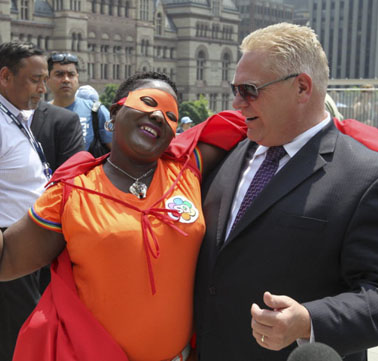
Former Toronto City Councillor Doug Ford dances with Ola Gaga during Pride Flag raising ceremony at City Hall, June 24, 2013. Alex Urosevic/National Post.
Some will say Doug Ford is the thinking man’s Donald Trump. Others will of course disagree. In this connection in any case I like Toronto Star columnist Martin Regg Cohn’s latest speculations:
“Will Cho be able to retain the seat in the next general election? Will the 80-year-old warhorse even want to run again, two years hence? Hard to say, but a better bet is that Brown has not seen the last of Ford, who makes no secret of his ambition to enter the legislature and one day lead the provincial Tories.”
And then there’s another Doug Ford speculation in the air : see, eg, “Doug Ford says he is considering running for mayor of Toronto in 2018.” (Which could save Patrick Brown some trouble in the spring 2018 Ontario provincial election … )
Whatever, the very bottom line seems to be that Ontario politics is about to get interesting again. It’s time for another dose of closer attention … even if Premier Wynne does seem to be spending too much time in Mexico … our NAFTA trading partner and auto sector rival, etc, etc, etc, etc …
(Oh, and if you live anywhere near the old City of Etobicoke, you just might want to check out “Annual Ford Fest to continue with barbecue this week, Doug Ford says” – in person! Meanwhile, we’ll always have J.H. Plumb’s wise words : “Traditions are quickly bred and quickly destroyed and they snap suddenly in a world of rapid social change.”)
